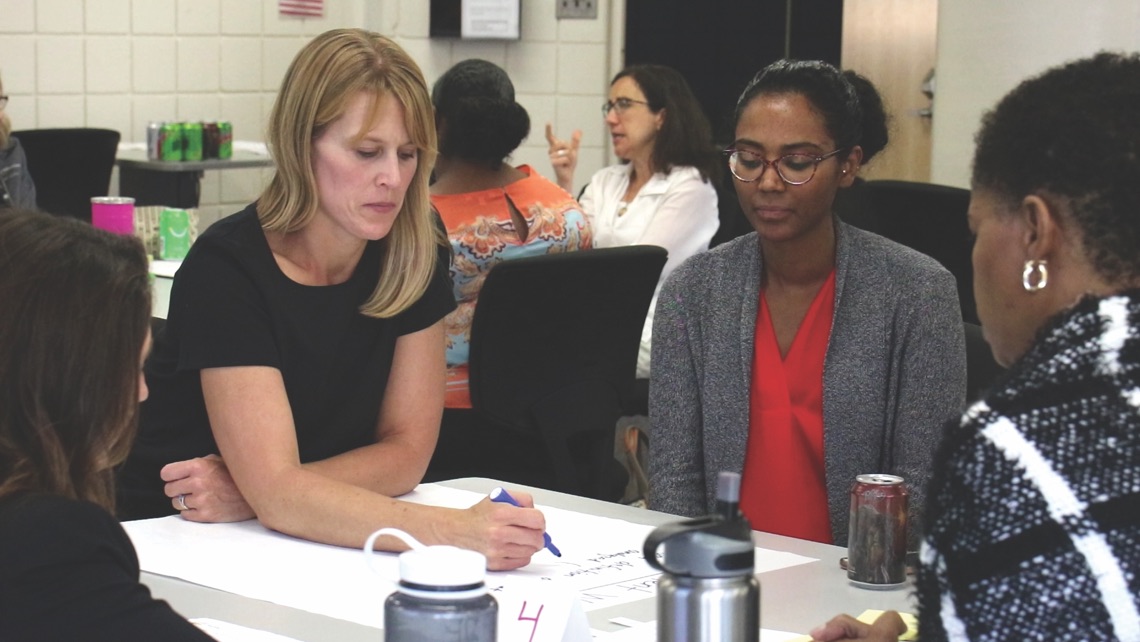Leveraging state partnerships to develop effective methods for training entry-level teachers
At the state level, TeachingWorks is collaborating with two networks of university-based teacher preparation programs in Maryland and Michigan, each with six member institutions, to develop powerful ways of training beginning teachers to teach skillfully and with care from their first day in the classroom.
These networks of education faculty members, researchers, teacher educators, and teacher preparation program administrators meet regularly throughout the academic year to develop a common language and understanding of the high-leverage practices. In sessions facilitated by TeachingWorks, members of the program networks work on developing and practicing new methods of teacher education while members of TeachingWorks provide coaching, feedback, and support.
“Many teacher preparation programs have not centered their curricula on the core tasks necessary for skillful teaching, such as interacting with families and assessing students’ progress.” Francesca Forzani, Deputy Director, TeachingWorks
“Many teacher preparation programs have not centered their curricula on the core tasks necessary for skillful teaching, such as interacting with families and assessing students’ progress. Instead, teachers’ training focuses on learning about teaching, rather than learning to teach,” said TeachingWorks Deputy Director Francesca Forzani. “Both program networks operate with the goal of transforming teacher preparation at their institutions by adjusting their courses to give their novice teachers opportunities to practice the fundamentals. By focusing on developing these resources and experiences for better preparing beginning teachers to do good work in the classroom, we have a powerful role to play in these state networks in advancing learning opportunities for each child in this country.”
Fostering community is a key emphasis of each program network as the institutions collaborate to identify shared challenges in preparing teachers and develop and try out solutions to managing these challenges.
Michigan Program Network
Launched in 2015, the Michigan Program Network (MiPN) comprises educators from six institutions across the state: Central Michigan University, Eastern Michigan University, Grand Valley State University, Michigan Technological University, Oakland University, and Spring Arbor University. This year, MiPN participants focused their work on developing ways to better bring the voices of mentor teachers—practicing teachers who host and mentor teacher candidates in their classrooms—into the program network community more broadly. This included exploring ways to recognize mentor teachers as teacher educators and to support them in coaching teacher candidates on high-leverage practices while they are in their field placements.
Oakland University, for example, has worked closely with a small group of mentor teachers who serve as liaisons within their schools, helping other mentor teachers understand and support their teacher candidates in learning to enact the high-leverage practices. Grand Valley State University is an active partner in the School- Based Teacher Education Partnership, a collaboration between their teacher educators, mentor teachers in Grand Rapids Public Schools, and TeachingWorks.
“Partnering through teaching practice is mutually beneficial to mentor teachers and the teacher educators who train beginning teachers in field placements,” said TeachingWorks Director of Partnerships Karen Ahn. “The collaboration allows teacher educators to better tailor their work with beginning teachers to be more relevant to children, and better fit the contexts in which they are likely to teach.”



